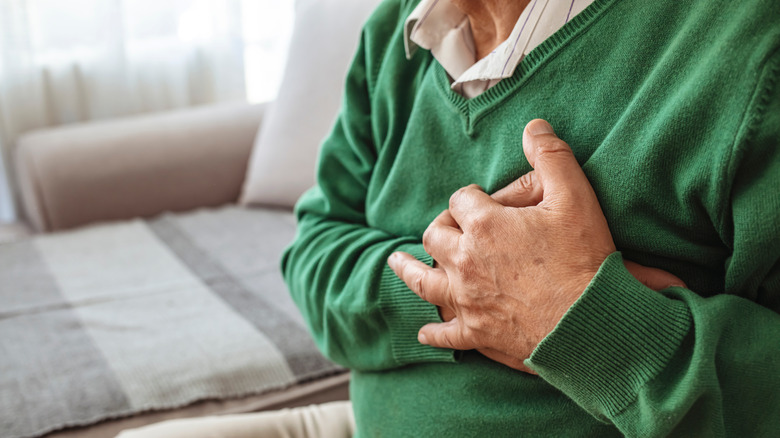How To Know When Heartburn Is Actually A Heart Attack
Feeling a random pain in your chest can be frightening and make you wonder if the underlying cause is heartburn or something more serious, like a heart attack. According to the National Heart, Lung, and Blood Institute (NIH), a heart attack can be triggered by plaque that accumulates in the arteries over time. Smoking, consuming a lot of saturated fats and sodium, and not exercising enough are some of the factors that contribute to heart disease. Heart attacks may also be more likely to occur in those who have a family history of heart disease.
The Centers for Disease Control and Prevention (CDC) reports that heart disease is the leading cause of death in the United States, and that a heart attack occurs almost every 40 seconds. As a result, detecting heart attack symptoms early is crucial for ensuring proper treatment.
Health Digest exclusively spoke with Dr. Elizabeth Klodas, a cardiologist and founder of Step One Foods, to learn about the differences between having heartburn and a heart attack. "Both conditions can present with chest discomfort and there can be overlap between what people actually feel and the circumstances around the occurrence of the symptoms," she explained to us. However, there are subtle differences between the two conditions, including the representation of their symptoms, what triggers the pain, and where the pain is felt. Let's dive deeper into what Dr. Klodas shared with us about distinguishing heartburn from a heart attack.
How to recognize genuine heartburn
Not every chest pain is grounds for extreme worry, and Dr. Elizabeth Klodas points out that timing could indicate whether your discomfort is being caused by heartburn. "[Heartburn] typically occurs sometime after a heavy meal," she told Health Digest, adding, "Especially if that meal contains heartburn triggers such as caffeine, chocolate, mint, alcohol, greasy and/or spicy foods." Heartburn is also known for waking people up in the middle of the night.
When trying to figure out if you have heartburn, it's important to pay attention to where in your body you are experiencing pain and discomfort. According to Dr. Klodas, heartburn begins in the center of the chest before traveling to the throat. If you're dealing with heartburn, there may be a burning sensation in your chest and a bitter taste in your throat. In most cases, heartburn doesn't cause pain in the shoulders, neck, or arms, as noted by Harvard Health Publishing. In addition, heartburn can intensify when someone lies down or bends over.
A lack of symptom improvement after taking heartburn medication is another way of differentiating heartburn from a heart attack. Usually, taking a liquid antacid or dissolvable antacid tablets is enough to relieve heartburn. "Even just drinking a small glass of low-fat milk can quickly and positively impact heartburn symptoms," Dr. Klodas said. If you're looking to avoid getting heartburn, you can eat fewer trigger foods, sleep in an inclined position, and refrain from exercising too vigorously after eating, according to Harvard Health Publishing.
Signs that could indicate a heart attack instead
Sometimes, the reason for someone's chest pain is more serious than just heartburn, and it's important to be able to recognize when this is the case. Unlike heartburn, Dr. Elizabeth Klodas points out that chest pain from a heart attack can travel toward the back and down the arms. "It's typically experienced as more of a pressure than burning sensation and is triggered by activity or stress and relieved with rest," she explained. Someone having a heart attack may experience tightness, squeezing, or stabbing sensations in their chest, according to Harvard Health Publishing.
During a heart attack, other symptoms can be present in addition to chest pain, including nausea, vomiting, dizziness, sweating, and shortness of breath. In addition, someone's heartbeat can become irregular or beat abnormally fast. Another indicator that someone may be having a heart attack is if their pain and discomfort doesn't improve after taking antacids. Individuals with high blood pressure, high blood sugar, high cholesterol, or diabetes may be more likely to experience a heart attack.
Heartburn and heart attack symptoms can appear similar in some cases, so it can be difficult to know which condition you're experiencing. In any case, it's better to err on the side of caution and get evaluated by your doctor if you're having any unusual symptoms. "If you're experiencing chest pain (burning or otherwise) that is new or different and that is not going away, seek emergency room evaluation," Dr. Klodas suggested.



